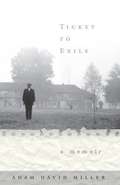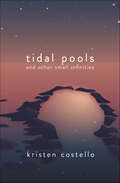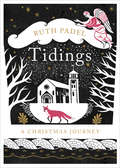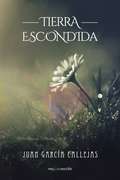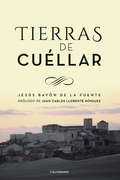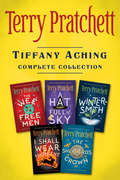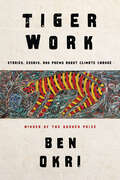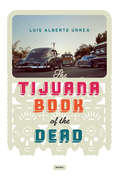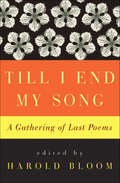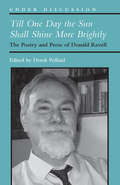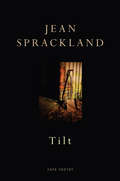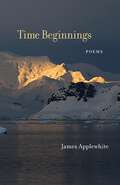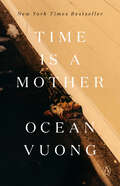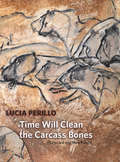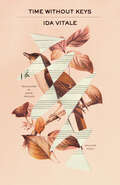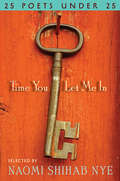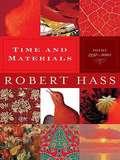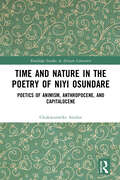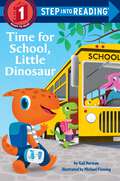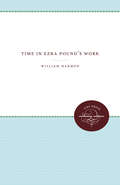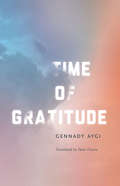- Table View
- List View
Ticket to Exile: A Memoir
by Adam David MillerAt age nineteen, A.D. Miller sat in a jail cell. His crime? He passed a white girl a note that read, ''I would like to get to know you better.'' For this he was accused of attempted rape. Ticket to Exile recounts Miller's coming-of-age in Depression-era Orangeburg, South Carolina. Miller reconstructs the sights, sounds and social complexities of the pre-civil rights South, and his youth as a closet rebel who successfully evaded the worst strictures of a racially segregated small town. By the time he is forced into exile, we realize that this fate was inevitable for a young man too intelligent and aware of the limitations of his society to remain there without disastrous consequences.
Tickets for a Prayer Wheel
by Annie DillardCelebrate re-publication of this Pulitzer Prize-winning author's first book of poems.
Tidal Pools and Other Small Infinities
by Kristen Costello"You'll walk away with more gratitude for the slow burn of the healing process." ó Alicia Cook, author of Sorry I Havenít Texted You BackTidal Pools and Other Small Infinities blurs the lines between endings and beginnings. The love story starts in the usual way: a whirlwind of confessions, late night conversations, and promises that seem sturdy. The years pass by, and novelty is replaced by a comforting routine ñ one thatís difficult to walk away from when things take a toxic turn. This is a collection about bravery and evolution. It takes courage to leave behind the familiar. To question all the things that once seemed undeniably true. To learn to stand on your own and, in doing so, become who you were really meant to be. Endings can be the best beginningsÖonce you realize you have the power to create them.
Tierra escondida
by Juan García CallejasUn canto ante el asombro de la vida y una reflexión lírica de los recuerdos de la infancia, la experiencia, los viajes, los lugares, las despedidas. <P><P>Tierra escondida es un conjunto de poemas organizado en etapas distintas, como una especie de recorrido con trazas de diario donde el autor nos desvela, a través de los flecos sueltos de la memoria, y la experiencia, la senda del autoconocimiento y el conocimiento de la realidad que nos vive. <P><P>Este poemario es un canto ante el asombro de la vida, y una reflexión lírica de los recuerdos de la infancia, la experiencia, los viajes, los lugares, las despedidas.
Tierras de Cuéllar
by Jesús Bayón de la FuenteConoce la villa de Cuéllar, una isla de arte mudéjar en un Mar de pinares. En la provincia de Segovia, comunidad autónoma de Castilla y León. Las páginas de este libro de poemas, como su mismo título indica, discurren sobre unas tierras castellanas, que llenaron mi infancia, parte de mi juventud, mi madurez y mi senectud. Comienza con un poema sobre el río Cega que surca la tierra de pinares y los campos que pertenecen a la villa de Cuéllar. Continúa hablando, en términos poéticos, de lugares y vistas singulares de Cuéllar, sus torres, campanarios, castillo, arcos defensivos o de entrada, tanto a la ciudad como a la ciudadela, cubos defensivos, e iglesias o conventos; sin olvidar sus charcas, lomas, montes, alamedas, pinares y dehesas. Igualmente se componen poemas sobre sus más famosas fiestas -los encierros de toros- más antiguos de España; fiestas que ningún natural de Cuéllar desea faltar a ellas ni una sola vez ensu vida. Finaliza la obra con un poema sobre la muy insigne poetisa cuellarana doña Alfonsa de la Torre y Rojas. Entre las páginas de poesía se encuentran colocadas un sinfín de fotografías sobre monumentos, campos, árboles y otros lugares de estas tierras de Cuéllar.
Tiffany Aching Complete 5-Book Collection: The Wee Free Men, A Hat Full of Sky, Wintersmith, I Shall Wear Midnight, The Shepherd's Crown (Tiffany Aching)
by Terry PratchettThis collection includes all five Tiffany Aching novels in Terry Pratchett's beloved and bestselling Discworld series, including the final Discworld novel, The Shepherd's Crown.The Wee Free Men: Armed with only a frying pan and her common sense, young witch-to-be Tiffany Aching must defend her home against the monsters of Fairyland. Luckily she has some very unusual help: the local Nac Mac Feegle—aka the Wee Free Men.A Hat Full of Sky: Tiffany Aching is ready to begin her apprenticeship in magic. She expects spells and magic—not chores and ill-tempered nanny goats! Surely there must be more to witchcraft than this! Indeed, there is. . . .Wintersmith: When the Spirit of Winter takes a fancy to Tiffany Aching, he wants her to stay in his gleaming, frozen world. Forever. It will take the young witch's skill and cunning, as well as help from the legendary Granny Weatherwax and the irrepressible Wee Free Men, to survive until Spring.I Shall Wear Midnight: As the witch of the Chalk, Tiffany Aching performs the distinctly unglamorous work of caring for the needy. But someone—or something—is inciting fear, generating dark thoughts and angry murmurs against witches. Tiffany must find the source of unrest and defeat the evil at its root, for if she falls, the whole Chalk falls with her. . . .The Shepherd's Crown: Deep in the Chalk, something is stirring. The owls and the foxes can sense it, and Tiffany Aching feels it in her boots. An old enemy is gathering strength. This is a time of endings and beginnings, old friends and new, a blurring of edges and a shifting of power. Now Tiffany stands between the light and the dark, the good and the bad. There will be a reckoning. . . .
Tiger Work: Poems, Stories and Essays About Climate Change
by Ben OkriIn this poignant, timely collection, the renowned Booker Prize–winning author evokes the magic of nature and the urgency of protecting our environment.Twenty thousand years after a catastrophe wiped out the human race, visitors uncover their final messages scattered across the planet, in flooded cities and disintegrating books. These writings reveal the tragedies of people who continued to live as they always did—fearfully, selfishly—even as the end of their world loomed. These haunting stories within a story, together with a powerful selection of poems, fables, and essays, are a necessary reminder of the beauty of the earth and the importance of addressing the climate crisis with clarity, artistry, and passion.
Tijuana Book of the Dead
by Luis Alberto UrreaFrom the author of Pulitzer-nominated The Devil's Highway and national bestseller The Hummingbird's Daughter comes an exquisitely composed collection of poetry on life at the border. Weaving English and Spanish languages as fluidly as he blends cultures of the southwest, Luis Urrea offers a tour of Tijuana, spanning from Skid Row, to the suburbs of East Los Angeles, to the stunning yet deadly Mojave Desert, to Mexico and the border fence itself. Mixing lyricism and colloquial voices, mysticism and the daily grind, Urrea explores duality and the concept of blurring borders in a melting pot society.
Till I End My Song: A Gathering of Last Poems
by Harold Bloom“A colossus among critics. . . . His enthusiasm for literature is a joyous intoxicant.” —New York TimesIn this charming anthology, esteemed literary critic Harold Bloom collects the last poems of history's most important and celebrated poets. As with his immensely popular Best Poems of the English Language, Bloom has carefully curated and annotated the final works of one hundred poets in Till I End My Song, with selections from John Keats, T.S. Eliot, Elizabeth Bishop, Emily Dickinson, Dylan Thomas, Robert Frost, D.H. Lawrence, W.H. Auden, John Milton, Herman Melville, Emily Brontë, and others. Written with the same wise and discerning commentary of earlier books—including his acclaimed Shakespeare: The Invention of the Human and The Book of J—Till I End My Song is a moving and provocative meditation on the relationship between art, meaning, and ultimately, death, from the literary titan of our time.
Till One Day the Sun Shall Shine More Brightly: The Poetry and Prose of Donald Revell (Under Discussion)
by Derek PollardSince the publication of From the Abandoned Cities in 1983, Donald Revell has been among the more consistent influencers in American poetry and poetics. Yet, his work has achieved the status it has—his honors include fellowships from the National Endowment for the Arts and the Guggenheim Foundation and awards from the PEN Center USA and American Poetry Review—in a manner that has often tended to belie its abiding significance. This collection of essays, reviews, and interviews is designed to ignite a more wide-ranging critical appraisal of Revell’s writing, from his fourteen collections of poems to his acclaimed translations of French symbolist and modernist poets to his artfully constructed literary criticism. Contributors such as Marjorie Perloff, Stephanie Burt, Dan Beachy-Quick, and Bruce Bond examine key elements in and across Revell’s work, from his visionary postmodernism (“Our words can never say the mystery of our meanings, but there they are: spoken and meaning worlds to us”) to his poetics of radical attention (“And so a poem has nothing to do with picking and choosing, with the mot juste and reflection in tranquility. It is a plain record of one’s entire presence”), in order to enlarge our understanding of how and why that work has come to occupy the place that it has in contemporary American letters.
Tilt
by Jean SpracklandJean Sprackland's third collection describes a world in free-fall. Chaos and calamity are at our shoulder, in the shape of fire and flood, ice-storm and hurricane; trains stand still, zoos are abandoned, migrating birds lose their way - all surfaces are unreliable, all territories unmapped. These are poems that explore the ambivalence and dark unease of slippage and collapse, but they also carry a powerful sense of the miraculous made manifest amongst the ordinary: the mating of natterjack toads, ice on the beach ('dream stuff, with its own internal acoustic') or 'the fund of life' in a used contraceptive. Bracken may run wild across the planet 'waiting for the moment/to pounce on the accident/of the discarded match' but there are also the significant wonders of children and the natural beauty of the world they've inherited. Tilt is a collection of raw, distressed and beautiful poems, a hymn to the remarkable survival of things in the face of threat - for every degradation an epiphany, for every drowning a birth.
Time Beginnings: Poems
by James ApplewhiteIn his poem “Afterward,” James Applewhite imagines a curious Eve in the Garden of Eden, her eye falling upon a twisting river and an S-shaped snake before she eats from the tree of knowledge, choosing change over stasis. Applewhite’s new collection Time Beginnings casts a keenly observant eye on the ever-varied natural world and meditates on the place of humans within it. In these philosophical poems, the slow creation of new planets in the farthest reaches of the galaxy mirrors the development of single-celled Earth organisms whose “first awareness . . . foretell[s] a consciousness / of self, the life lived knowing of death.”Meditating upon topics as far-ranging as the movement of photons in the heart of the sun and the single drop of blood on the finger of a girl holding a rosebud, James Applewhite’s poems explore deeply the mysteries of the galaxies and the complexities of being human.
Time Is a Mother
by Ocean Vuong"Take your time with these poems, and return to them often.&” —The Washington PostThe New York Times-bestselling collection of poems from the award-winning writer Ocean VuongHow else do we return to ourselves but to fold The page so it points to the good part In this deeply intimate second poetry collection, Ocean Vuong searches for life among the aftershocks of personal and social loss, embodying the paradox of sitting in grief while being determined to survive beyond it. Shifting through memory, and in concert with the themes of his novel On Earth We&’re Briefly Gorgeous, Vuong contends with the meaning of family and the cost of being the product of an American war in America. At once vivid, brave, and propulsive, these poems circle fragmented lives to find both restoration as well as the epicenter of the break. The author of the critically acclaimed poetry collection Night Sky with Exit Wounds, winner of the 2016 Whiting Award, the 2017 T. S. Eliot Prize, and a 2019 MacArthur fellowship, Vuong writes directly to our humanity without losing sight of the current moment. These poems represent a more innovative and daring experimentation with language and form, illuminating how the themes we perennially live in and question are truly inexhaustible. Bold and prescient, and a testament to tenderness in the face of violence, Time Is a Mother is a return and a forging forth all at once.
Time Will Clean the Carcass Bones: Selected and New Poems
by Lucia Perillo"Perillo's poetic persona is funny, tough, bold, smart, and righteous. A spellbinding storyteller and a poet who makes the demands of the form seem as natural as a handshake."--Booklist"The poems [are] taut, lucid, lyric, filled with complex emotional reflection while avoiding the usual difficulties of highbrow poetry."--The New York Times Book ReviewMacArthur Genius Award winner Lucia Perillo is a fearless poet who, with characteristic humor and incisive irony, confronts the failings and wonder of nature, particularly the frail and resilient human body. This generous collection draws upon five previous volumes, including books selected as a New York Times "100 Notable Books of the Year" and as a finalist for the Pulitzer Prize.From "Again, the Body":When you spend many hours alone in a roomyou have more than the usual chances to disgust yourself--this is the problem of the body, not that it is mortalbut that it is mortifying. When we were young they taught usdo not touch it, but who can keep from touching it,from scratching off the juicy scab?...Lucia Perillo graduated from McGill University in Montreal with a major in wildlife management, and subsequently worked for the US Fish and Wildlife Service. She completed her MA in English at Syracuse University, and has published eight books of poetry, fiction, and nonfiction. She was a MacArthur Fellow and a finalist for the Pulitzer Prize. She lives in Olympia, Washington.
Time Without Keys: Selected Poems
by Ida VitaleA landmark collection of poetry by one of Latin America’s most important living writers. The celebrated writer Álvaro Mutis envied new readers of Ida Vitale’s poetry: “unexpected pleasures await them.” Time Without Keys: Selected Poems is the first volume of Vitale’s illustrious poetry to appear in the US. The selection spans seventy-five years and the wonders within abound—the skies over Montevideo, falconry, the saxifrage’s bloom, gratitude for the alphabet and summer—as do urgent questions about our relationship with the world. How does our perception of time shape history, as well as our social and political constructs? Vitale’s poetic and human vitality have made her a storied figure in the Spanish language and beyond; her writing revered for being classic and modern, precise and lucid, intellectually challenging and rich in tradition. This bilingual edition, presented in reverse chronological order, offers the reader both a wide range of Vitale’s most beloved poems, as well as a wealth of recent work. The translator Sarah Pollack, Vitale’s first translator into English, has written an informative afterword about Vitale’s life and work.
Time You Let Me In: 25 Poets under 25
by Naomi Shihab NyeThey are inspiring talented stunning remarkable wise They are also fearless depressed hilarious impatient in love out of love pissed off And they want you to let them in.
Time and Materials: Poems 1997-2005
by Robert HassThe poems in Robert Hass's new collection-his first to appear in a decade-are grounded in the beauty and energy of the physical world, and in the bafflement of the present moment in American culture. This work is breathtakingly immediate, stylistically varied, redemptive, and wise.<P><P> His familiar landscapes are here—San Francisco, the Northern California coast, the Sierra high country—in addition to some of his oft-explored themes: art; the natural world; the nature of desire; the violence of history; the power and limits of language; and, as in his other books, domestic life and the conversation between men and women. New themes emerge as well, perhaps: the essence of memory and of time.<P> The works here look at paintings, at Gerhard Richter as well as Vermeer, and pay tribute to his particular literary masters, friend Czeslaw Milosz, the great Swedish poet Tomas Tranströmer, Horace, Whitman, Stevens, Nietszche, and Lucretius. We are offered glimpses of a surprisingly green and vibrant twenty-first-century Berlin; of the demilitarized zone between the Koreas; of a Bangkok night, a Mexican desert, and an early summer morning in Paris, all brought into a vivid present and with a passionate meditation on what it is and has been to be alive. "It has always been Mr. Hass's aim," the New York Times Book Review wrote, "to get the whole man, head and heart and hands and everything else, into his poetry."<P> Winner of the 2007 National Book Award for Poetry, and the 2008 Pulitzer Prize for Poetry.
Time and Nature in the Poetry of Niyi Osundare: Poetics of Animism, Anthropocene, and Capitalocene (Routledge Studies in African Literature)
by Chukwunwike AnolueThis book provides an ecocritical analysis of the poetry of the famous Nigerian poet Niyi Osundare. It interrogates the intricate interface between time and nature in 11 of Osundare’s defining poetry collections. This is a book of postcolonial ecocriticism from an African perspective. It brings together the ecocritical theory of animism and theories of geologic time in the discussion of Osundare’s poetry. Osundare shows that animism has a lot to offer in enriching human understanding of the ecosystem. And while he eloquently catalogues problems undermining the health of the earth in this age of the Anthropocene and the Capitalocene in his poetry, he also holds on to the hope of a better future. The book concludes that Osundare’s optimism is what informs his use of poetry to press humankind to rise to the duty of salvaging the environment. Deploying an interdisciplinary approach that stretches across the fields of literature, religion, geology, physics, economics, and anthropology, this book will be an important read for those looking for fresh ways to understand Osundare’s poetry and African nature writing.
Time and the Erotic in Horace’s Odes
by Ronnie AnconaIn Horace's Odes love cannot last. Is the poet unromantic, as some critics claim? Is he merely realistic? Or is he, as Ronnie Ancona contends, relating the erotic to time in a more complex and interesting way than either of these positions allows? Rejecting both the notion that Horace fails as a love poet because he undermines the romantic ideal that love conquers time and the notion that he succeeds becauses he eschews illusions about love's ability to endure, this book challenges the assumption that temporality must inevitably pose a threat to the erotic. The author argues that temporality, understood as the contingency the male poet/lover wants to but cannot control, explains why love "fails" in Horace's Odes.Drawing on contemporary theory, including recent work in feminist criticism, Ancona provides close readings of fourteen odes, which are presented in English translation as well as in Latin. Through a discussion of the poet's use of various temporal devices--the temporal adverb, seasonal imagery, and the lover or beloved's own temporality--she shows how Horace makes time dominate the erotic context and, further, how the version of love that appears in his poems is characterized by the lover's desire to control the beloved. The romantic ideal of a timeless love, apparently rejected by the poet, emerges here instead as an underlying element of the poet's portrayal of the erotic. In a critique of the predominant modes of recent Horatian scholarship on the love odes, Ancona offers an alternative view that takes into account the male gender of the lover and its effect on the structure of desire in the poems. By doing so, she advances a broader project in recent classical studies that aims to include discussion of features of classical literature, such as sexuality and gender, which have previously escaped critical attention.Addressing aspects of Horace as a love poet--especially the dynamics of gender relations--that critics have tended to ignore, this book articulates his version of love as something not to be championed or condemned but rather to be seen as challengingly problematic. Of primary interest to classicists, it will also engage the attention of scholars and teachers in the humanities with specializations in gender, sexuality, lyric poetry, or feminist theory.
Time for School, Little Blue Truck: A Back To School Book For Kids (Little Blue Truck Ser.)
by Alice SchertleRide along to school with the #1 New York Times best-selling Little Blue Truck and meet Blue's new friend: a bright yellow school bus. Beep-beep! Little Blue Truck and his good friend Toad are excited to meet a bright yellow school bus on the road. They see all the little animals lined up in the school bus's many windows, and Blue wishes he could be a school bus too. What a fun job-but much too big for a little pickup like Blue. Or is it? When somebody misses the bus, it's up to Blue to get his friend to school on time. Beep! Beep! Vroom!
Time for School, Little Dinosaur (Step into Reading)
by Gail HermanFrom the most trusted brand of leveled readers, this Step 1 Step into Reading book is perfect for back-to-school and features an adorable dinosaur world that looks a lot like ours.Who&’s ready to go back to school? Little Dinosaur is! This simple Step 1 book will help your eager little dinosaur get ready. Though his friend Spikey teases him, Little Dinosaur is first in line for the school bus on the first day of school. Will Spikey learn to get ready as well as Little Dinosaur does, or will he miss the bus? Perfect for first-day jitters or for any parent wanting a model of good behavior for the occasionally trying getting-ready-for-school hour! Step 1 Readers feature big type and easy words for children who know the alphabet and are eager to begin reading. Rhyme and rhythmic text paired with picture clues help children decode the story.
Time for a Rhyme
by Ellen WilkieShare this book with a child age three and up. With your help children can guess words to rhyme with thirteen starter words. They turn the page to find the book's examples of words that match the clue. All clues and answers are illustrated with cheerful, large, easy to identify pictures which are described. Three or four additional rhymes are given for each of the main rhyming pairs. Here's a fun learning game to play with the little one in your life. It can also ease a child into snuggling down and going to sleep.
Time in Ezra Pound's Work
by William HarmonThroughout nearly sixty-five of writing, Pound specialized on the suffocating effects of time on poetry, aesthetic form, and history. Harmon examines Pound's strategies for dealing with time and arrives at a persuasive reading of Pound's works in general and of the The Cantos in particular. By concentrating on a single theme and technique, the author demonstrates a coherence in the writing that elucidates the corpus for both the specialist and the casual reader.Originally published in 1977.A UNC Press Enduring Edition -- UNC Press Enduring Editions use the latest in digital technology to make available again books from our distinguished backlist that were previously out of print. These editions are published unaltered from the original, and are presented in affordable paperback formats, bringing readers both historical and cultural value.
Time of Gratitude
by Peter France Gennady AygiA collection of extraordinary essays by one of the seminal Russian poets of the twentieth century Gennady Aygi’s longtime translator and friend Peter France has compiled this moving collection of tributes dedicated to some of the writers and artists who sustained him while living in the Moscow “underground.” Written in a quiet intensely expressive poetic style, Aygi’s inventive essays blend autobiography with literary criticism, social commentary, nature writing, and enlightening homage. He addresses such literary masters as Pasternak, Kafka, Mayakovsky, Celan, and Tomas Tranströmer, along with other writers from the Russian avant-garde and his native Chuvashia. Related poems by Aygi are also threaded between the essays. Reminiscent of Mandelstam’s elliptical travel musings and Kafka’s intensely spiritual jottings in his notebooks, Time of Gratitude glows with the love and humanity of a sacred vocation. “These leaves of paper," Aygi says, 'are swept up by the whirlwind of festivity; everything whirls—from Earth to Heaven—and perhaps the Universe too begins to swirl. Everything flows together in the rainbow colors and lights of the infinite world of Poetry.'
